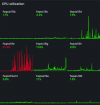root@063-pve-04347:~# lscpu
Architecture: x86_64
CPU op-mode(s): 32-bit, 64-bit
Address sizes: 46 bits physical, 48 bits virtual
Byte Order: Little Endian
CPU(s): 56
On-line CPU(s) list: 0-55
Vendor ID: GenuineIntel
BIOS Vendor ID: Intel
Model name: Intel(R) Xeon(R) CPU E5-2690 v4 @ 2.60GHz
BIOS Model name: Intel(R) Xeon(R) CPU E5-2690 v4 @ 2.60GHz CPU @ 2.6GHz
BIOS CPU family: 179
CPU family: 6
Model: 79
Thread(s) per core: 2
Core(s) per socket: 14
Socket(s): 2
Stepping: 1
CPU(s) scaling MHz: 75%
CPU max MHz: 3500.0000
CPU min MHz: 1200.0000
BogoMIPS: 5200.00
Flags: fpu vme de pse tsc msr pae mce cx8 apic sep mtrr pge mca cmov pat pse36 clflush dts acpi mmx
fxsr sse sse2 ss ht tm pbe syscall nx pdpe1gb rdtscp lm constant_tsc arch_perfmon pebs bts re
p_good nopl xtopology nonstop_tsc cpuid aperfmperf pni pclmulqdq dtes64 monitor ds_cpl vmx sm
x est tm2 ssse3 sdbg fma cx16 xtpr pdcm pcid dca sse4_1 sse4_2 x2apic movbe popcnt tsc_deadli
ne_timer aes xsave avx f16c rdrand lahf_lm abm 3dnowprefetch cpuid_fault epb cat_l3 cdp_l3 in
vpcid_single ssbd ibrs ibpb stibp tpr_shadow vnmi flexpriority ept vpid ept_ad fsgsbase tsc_a
djust bmi1 hle avx2 smep bmi2 erms invpcid rtm cqm rdt_a rdseed adx smap intel_pt xsaveopt cq
m_llc cqm_occup_llc cqm_mbm_total cqm_mbm_local dtherm ida arat pln pts md_clear flush_l1d
Virtualization features:
Virtualization: VT-x
Caches (sum of all):
L1d: 896 KiB (28 instances)
L1i: 896 KiB (28 instances)
L2: 7 MiB (28 instances)
L3: 70 MiB (2 instances)
NUMA:
NUMA node(s): 2
NUMA node0 CPU(s): 0,2,4,6,8,10,12,14,16,18,20,22,24,26,28,30,32,34,36,38,40,42,44,46,48,50,52,54
NUMA node1 CPU(s): 1,3,5,7,9,11,13,15,17,19,21,23,25,27,29,31,33,35,37,39,41,43,45,47,49,51,53,55
Vulnerabilities:
Itlb multihit: KVM: Vulnerable
L1tf: Mitigation; PTE Inversion; VMX vulnerable
Mds: Vulnerable; SMT vulnerable
Meltdown: Vulnerable
Mmio stale data: Vulnerable
Retbleed: Not affected
Spec store bypass: Vulnerable
Spectre v1: Vulnerable: __user pointer sanitization and usercopy barriers only; no swapgs barriers
Spectre v2: Vulnerable, IBPB: disabled, STIBP: disabled, PBRSB-eIBRS: Not affected
Srbds: Not affected
Tsx async abort: Vulnerable


